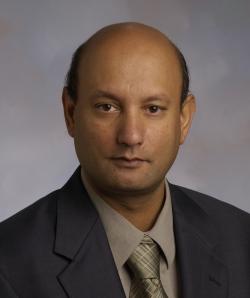“Brilliant,” “dedicated” and “wonderful” are just a few of the words being used to describe revered Case Western Reserve University School of
Medicine faculty member Chris G. Dealwis, who passed away unexpectedly last weekend while visiting family in England.
As a scientist, Dealwis’ groundbreaking discoveries in the laboratory led to the development of treatments for diseases such as cancer and Alzheimer’s. An associate professor of pharmacology and member of the Case Comprehensive Cancer Center, his commitment to unlocking the mysteries of biology never wavered—even when he lost his sight several years ago.
The loss “never seemed to slow him down,” Professor Amy Wilson-Delfosse said of her “beloved” colleague. “He could sit in the back of a seminar room and ask questions that proved he never missed a beat. … And always silently but steadfastly at his side was his wife, Martha, who supported Chris every moment of the day so that he could do the work he loved.”
Martha became his eyes, allowing Dealwis to continue the decades-long search for scientific discoveries to improve people’s health.
“Chris was an exceptional member of the School of Medicine and a remarkable individual with incredible dedication to the department and his work,” said School of Medicine Dean Stan Gerson. “His research in pharmacology led to the development of novel therapeutics against cancer, Alzheimer’s disease and microbial infections.”
Wilson-Delfosse emphasized his commitment to training the next generation of physicians. He began teaching during the COVID-19 pandemic as a Case Inquiry facilitator—the small-group, student-centered learning method at the heart of the school’s Western Reserve2 curriculum—where students and fellow facilitators “greatly appreciated” his insights into the process, Wilson-Delfosse, the associate dean for curriculum, said.
A remarkable research career
Dealwis earned his doctorate from Birkbeck College at University of London, where he developed his passion for understanding the molecular and structural underpinnings of protein function. During his formative years, he studied renin, a major regulator of blood pressure, and used X-ray crystallography to solve the structures of the mouse and human isoforms in complex with various inhibitors. This work led to several papers, including his first publication, which appeared in Nature.
Dealwis continued to refine his skills and make groundbreaking discoveries on the structure and function of a broad range of proteins that directly impacted human health during his postdoctoral training, including factors that control antibiotic resistance, hepatitis, Alzheimer’s and AIDS.
In 1999, Dealwis began his independent research career as an assistant professor of biochemistry and cellular molecular biology at University of Kentucky. There, he started his earnest, nearly two-decade hunt to discover mechanisms that control ribonucleotide reductase to improve the chemotherapeutic targeting of this key enzyme in cancer.
In 2007, he was recruited to Case Western Reserve University School of Medicine, where he continued his own research and established a high-throughput crystallization core to facilitate the analysis of crystal structures.
Dealwis’ work was highly innovative and changed scientific understanding of how RNR controls the cellular pools of nucleotides, which are the building blocks of DNA. An outstanding structural biologist, he was always keen to use his knowledge to develop new therapies.
As a collaborator, Dealwis was known for his willingness to share insights to help enhance a wide variety of projects. He was also an exceptional mentor and educator, always patient and supportive of trainees interested in drug development, his colleagues said.
In addition to his support of other research teams, Dealwis published several seminal papers on the binding of the standard-of-care drug gemcitabine to RNR. Moreover, he discovered how this enzyme is allosterically controlled by nucleotides. This finding led him to identify and develop novel inhibitors of RNR.
Before he left for Europe, Dealwis had been investigating a series of novel inhibitors of RNR that he had developed in preclinical models of pancreatic and breast cancer. He had begun assessing the potential utility of these drugs with collaborators in Cleveland and across the globe.
A funeral will be held in England and livestreamed around the world on Aug. 6 at 10 a.m. BST. Find more information on the memorial webpage. To honor Dealwis’s impact on advancing science, the medical school will hold a memorial research seminar in the fall.
Students who would like support during this time are encouraged to contact counseling services at 216.368.5872. This line is staffed by a counselor 24 hours a day, seven days a week. Faculty and staff can access counseling at any time by calling IMPACT Solutions at 1.800.227.6007; they can learn more about their programs at myimpactsolution.com.


